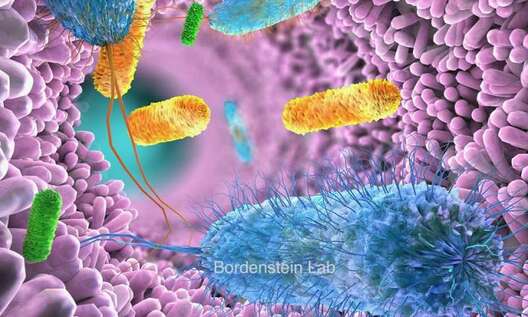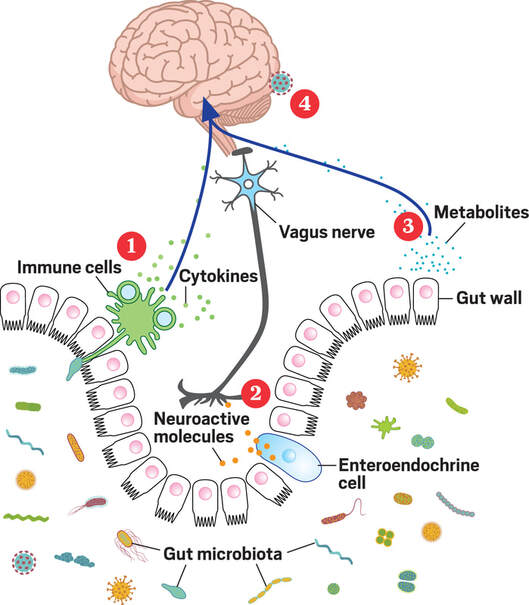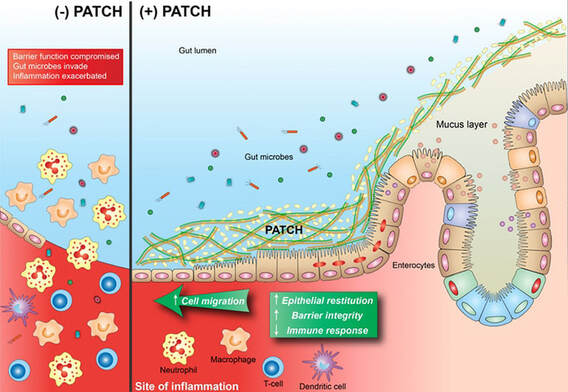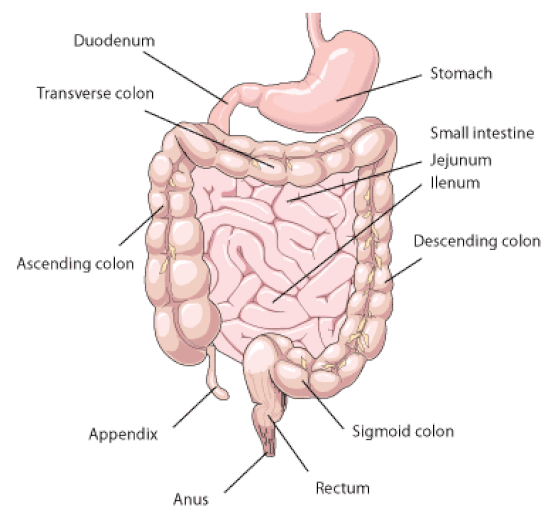🌸
When I was growing up, my mom had a big garden. We would help her pick the green beans, broccoli, and tomatoes; and without fail, I wouldn't want to eat the veggies. Most kids and many adults don't want to eat their veggies, but let me tell you how you can change all of that.
Not wanting your veggies is a two-fold issue. If you don't eat them on a regular basis, your microbiome will shift and you'll crave the types of foods you eat on a regular basis due to the microbes in your gut. The other connection is in your brain.
How can tiny microbes, and remember we have trillions of them inside us, change whether you crave chips or broccoli? Researchers at Athena Aktipis, at the University of San Francisco 1 found that the bacteria in your body can sway how full you feel and can also tap into the nerve pathways that link your stomach and your brain.
The vagus nerve plays a major role in brain-gut signaling. This nerve acts as a major highway in the brain-gut connection by connecting over 100 million neurons in the enteric nervous system to the medulla (located at the base of the brain). Microbes can produce neurotransmitters in the gut which affect the brain. Research2 has shown that therapy using a vagus nerve blockade can lead to marked weight loss, while vagus nerve stimulation is known to trigger3 excessive eating.
Kefir Ranch Dressing
Many gut bacteria can manufacture special proteins4 (called peptides) that are very similar to hormones (such as leptin and ghrelin) that regulate hunger. Humans and other animals have produced antibodies against these peptides. These microbes can directly influence how we eat and they do it through their peptides that mimic hunger hormones or indirectly through antibodies that can mess with appetite regulation.
So not only can microbes tell your brain what to crave, but they can also change your taste receptors which make some foods seem more appealing than others. Microbes have ways to manipulate us into eating or not eating certain foods. So, if you have a gut filled with microbes that depend on sugar, those microbes would then be under strong pressure to get you to eat more of what they depend on, potentially leading to cravings for those foods - sugar in this case.
Salads Are Fertilizer For Your Good Microbes
Leafy greens in salads have huge health benefits and it's really important to eat them but also enjoy them. Many fruits and vegetables are prebiotics. Prebiotics are food for your good bacteria.
Prebiotics act as a fertilizer to promote the growth of the good bacteria in our gut. This is essential to the health and function of our immune system. You want a large amount of diverse, good bacteria in your gut, and eating cultured foods accomplishes this.
With the addition of prebiotics, you have a super-strong combination that boosts your immune system. Prebiotics also strengthen your ability to absorb calcium, magnesium, and other minerals usually lacking in our diets.
Reduce Chance Of Stroke And Heart Disease
A diet rich in vegetables, fruits, and probiotics can lower blood pressure,5reduce the risk of heart disease and stroke,6 and help keep digestive problems at bay. It can also help you lose weight by keeping your appetite in check and by balancing blood sugars.7
Most everybody knows that eating salads is a healthy thing to do but often people don't do it. The more salads you eat, the more you'll crave them. Microbes in your gut reorganize when you eat different types of foods. You will crave the foods you eat the most as your microbes and enzymes increase to accommodate your food preferences. You are what you eat, so make good choices!
Reduce Chronic Inflammation
Inflammation is part of the body's immune response; without it, we can't heal. Studies have suggested that vitamin E may play a key role in protecting the body from pro-inflammatory molecules called cytokines. Vitamin E is one of the best sources and is found in dark green veggies such as spinach, kale, broccoli, and collard greens.
Dark greens and cruciferous vegetables also tend to have higher concentrations of vitamins and minerals—like calcium, iron, and disease-fighting phytochemicals—than those with lighter-colored leaves.
Salads Help with Weight Loss
Eating a fiber-rich salad will help you to feel full faster, so you’ll consume a smaller amount of calories than you might when a meal is served without this salad appetizer. Adding a probiotic dressing will help you receive more nutrients from all of the fruits and veggies. The more raw vegetables you can incorporate into your salad, the greater the potential positive effects will be. Adequate fiber intake helps with weight loss and healthy weight maintenance. It normalizes bowel movements and aids in the prevention of bowel disease.
References:
Not wanting your veggies is a two-fold issue. If you don't eat them on a regular basis, your microbiome will shift and you'll crave the types of foods you eat on a regular basis due to the microbes in your gut. The other connection is in your brain.
How can tiny microbes, and remember we have trillions of them inside us, change whether you crave chips or broccoli? Researchers at Athena Aktipis, at the University of San Francisco 1 found that the bacteria in your body can sway how full you feel and can also tap into the nerve pathways that link your stomach and your brain.
The vagus nerve plays a major role in brain-gut signaling. This nerve acts as a major highway in the brain-gut connection by connecting over 100 million neurons in the enteric nervous system to the medulla (located at the base of the brain). Microbes can produce neurotransmitters in the gut which affect the brain. Research2 has shown that therapy using a vagus nerve blockade can lead to marked weight loss, while vagus nerve stimulation is known to trigger3 excessive eating.
Kefir Ranch Dressing
Many gut bacteria can manufacture special proteins4 (called peptides) that are very similar to hormones (such as leptin and ghrelin) that regulate hunger. Humans and other animals have produced antibodies against these peptides. These microbes can directly influence how we eat and they do it through their peptides that mimic hunger hormones or indirectly through antibodies that can mess with appetite regulation.
So not only can microbes tell your brain what to crave, but they can also change your taste receptors which make some foods seem more appealing than others. Microbes have ways to manipulate us into eating or not eating certain foods. So, if you have a gut filled with microbes that depend on sugar, those microbes would then be under strong pressure to get you to eat more of what they depend on, potentially leading to cravings for those foods - sugar in this case.
Salads Are Fertilizer For Your Good Microbes
Leafy greens in salads have huge health benefits and it's really important to eat them but also enjoy them. Many fruits and vegetables are prebiotics. Prebiotics are food for your good bacteria.
Prebiotics act as a fertilizer to promote the growth of the good bacteria in our gut. This is essential to the health and function of our immune system. You want a large amount of diverse, good bacteria in your gut, and eating cultured foods accomplishes this.
With the addition of prebiotics, you have a super-strong combination that boosts your immune system. Prebiotics also strengthen your ability to absorb calcium, magnesium, and other minerals usually lacking in our diets.
Reduce Chance Of Stroke And Heart Disease
A diet rich in vegetables, fruits, and probiotics can lower blood pressure,5reduce the risk of heart disease and stroke,6 and help keep digestive problems at bay. It can also help you lose weight by keeping your appetite in check and by balancing blood sugars.7
Most everybody knows that eating salads is a healthy thing to do but often people don't do it. The more salads you eat, the more you'll crave them. Microbes in your gut reorganize when you eat different types of foods. You will crave the foods you eat the most as your microbes and enzymes increase to accommodate your food preferences. You are what you eat, so make good choices!
Reduce Chronic Inflammation
Inflammation is part of the body's immune response; without it, we can't heal. Studies have suggested that vitamin E may play a key role in protecting the body from pro-inflammatory molecules called cytokines. Vitamin E is one of the best sources and is found in dark green veggies such as spinach, kale, broccoli, and collard greens.
Dark greens and cruciferous vegetables also tend to have higher concentrations of vitamins and minerals—like calcium, iron, and disease-fighting phytochemicals—than those with lighter-colored leaves.
Salads Help with Weight Loss
Eating a fiber-rich salad will help you to feel full faster, so you’ll consume a smaller amount of calories than you might when a meal is served without this salad appetizer. Adding a probiotic dressing will help you receive more nutrients from all of the fruits and veggies. The more raw vegetables you can incorporate into your salad, the greater the potential positive effects will be. Adequate fiber intake helps with weight loss and healthy weight maintenance. It normalizes bowel movements and aids in the prevention of bowel disease.
References:
- https://www.sciencedaily.com/releases/2014/08/140815192240.htm
- https://www.ncbi.nlm.nih.gov/pmc/articles/PMC5063945/
- https://www.ncbi.nlm.nih.gov/pmc/articles/PMC2597723/
- https://www.ncbi.nlm.nih.gov/pubmed/18262391
- https://www.sciencedaily.com/releases/2018/04/180425131909.htm
- https://articles.mercola.com/sites/articles/archive/2018/05/28/probiotics-may-lower-heart-attack-stroke-risks.aspx
- https://www.hsph.harvard.edu/nutritionsource/what-should-you-eat/vegetables-and-fruits/
🌸
🌸





